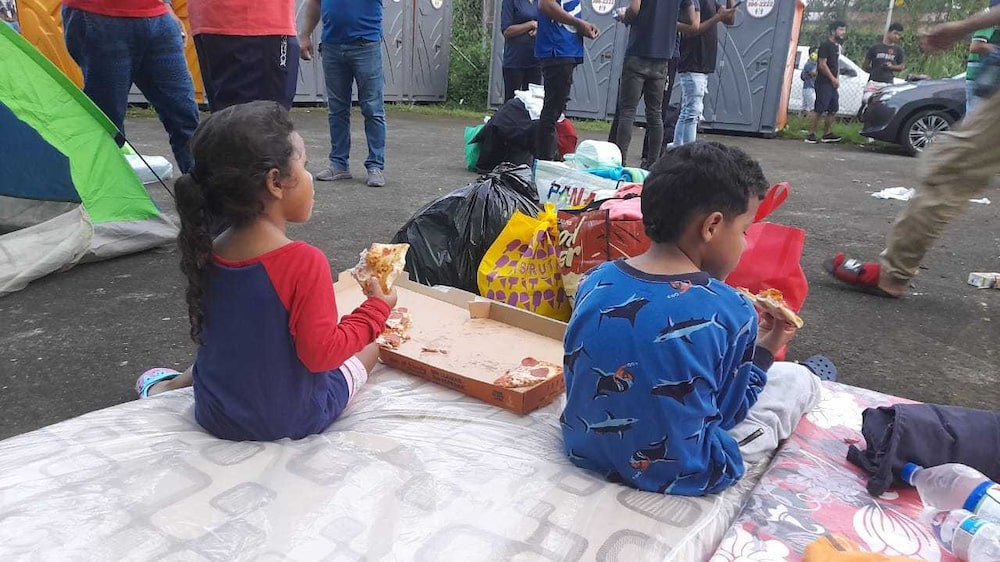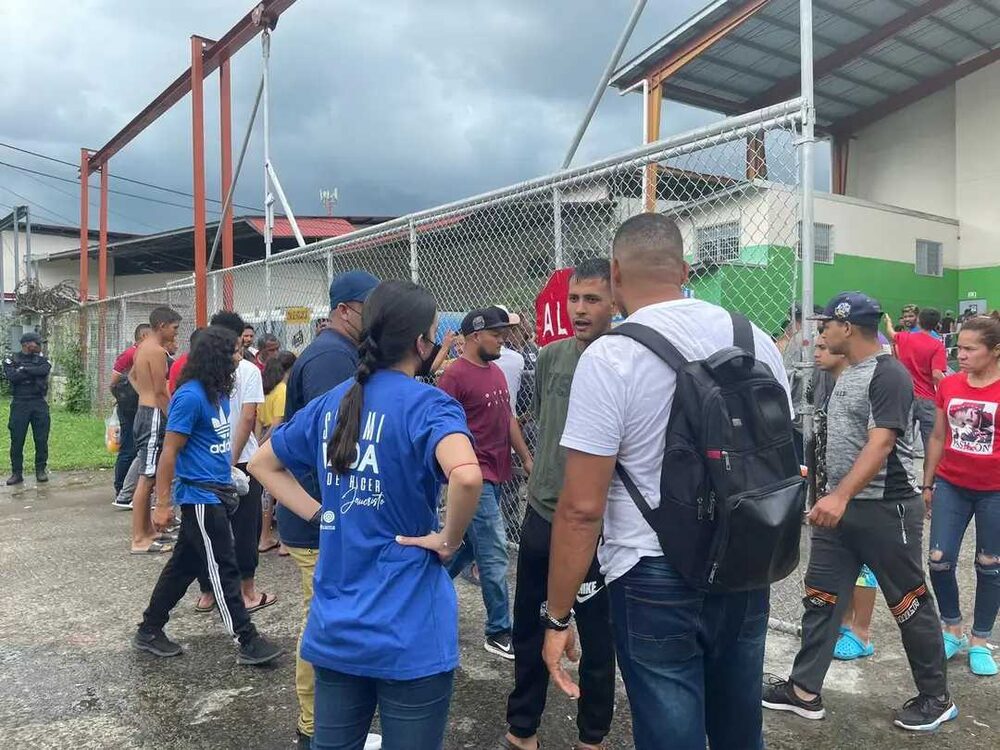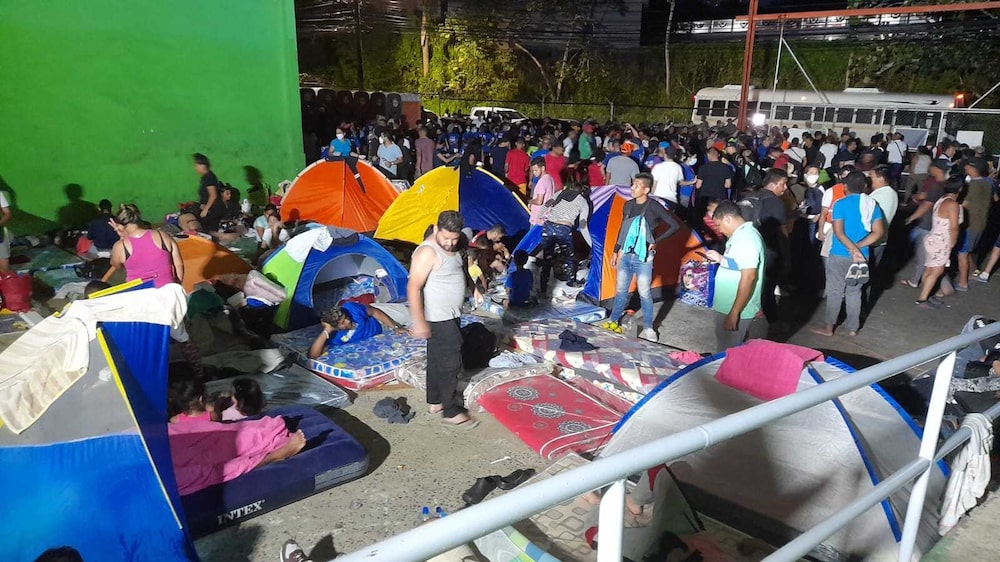Panama City — In the dense Darién jungle, between Colombia and Panama, their stories are as deep as the footprints they leave and must now follow back to Venezuela, their country of origin.
The measure announced earlier this month by the United States government that it would expel Venezuelan migrants if they enter the country irregularly, and which will provide only 24,000 visas for Venezuelans requesting to arrive at US ports of entry by air, took many Venezuelans by surprise.
Now, crammed into a shelter in Panama City, they are waiting to be returned to their country to rebuild their lives, with nothing more than the memories of a frustrated dream that disappeared like a mirage along the way.
“Everything we built we sold with the desire to achieve the so-called American dream. I would like to sleep, to feel that everything is a dream, and that this is not happening to me”, says Douglas Gálvez, with his voice cracking and on the verge of tears, and who, with his family, left Maracaibo in search of new horizons.
With a light complexion, beard and untrimmed hair, he says that he convinced his wife to make the journey, and together with their two children of 4 and 7 years of age, with $850 in their pockets, they left for Colombia.
Once there, in Necoclí, they took a boat to the Darién jungle, and set out on a 100km trek to Panama.

According to Colombian authorities, some 10,000 migrants are poised at the border to cross into Panama, where they have been stranded as a result of the new US policy.
Douglas and his family managed to get as far as Guatemala, where the news hit them like a bucket of cold water, he says, and they decided to return to Panama, where today his children are sick, his wife is in a state of shock because of what she has experienced and, as if that were not enough, he must scrape together $280 for each of them to be able to return to his country.
In Venezuela however, they will no longer have a roof over their heads, having sold the zinc hut in which they lived, as well as all the belongings they had accumulated during their 12 years as a couple.

The plight of Venezuelan migrants is worsening now that Panama has closed its border to those who come from the north and do not have an entry visa.
Despite feeling discouraged, Douglas Gálvez considers himself lucky, because he can tell his story, unlike those who died on the way.
A tough journey
The family spent seven days crossing “mountains as steep as stairs” and cliffs, where their legs sank in the mid, carrying the girl on their backs and leading the seven-year-old boy by their hand, avoiding snakes and other animals. Darién was the “hardest” part of the journey, says Gálvez.

Now, in the shelter managed by the Venezuelan embassy and the Mires Panamá church, the little boy is walking with difficulty and has fainted. His father attributes his discomfort to the weakness caused by diarrhea from drinking water from the river, and also because his feet are injured from the long walk.

Their food and drink ran out after three days of walking through the Darién jungle, and they lost their belongings when they crossed one of the many rivers along the way.
“The current was so strong that it dragged me with my backpack, I had my daughter on top of me and I had to decide. If I grabbed the backpack I had to let go of my daughter, so we lost everything, but the four of us managed to get out of the jungle together to take the canoes to reach the UN post” in Bajo Chiquito, Gálvez recalls.
He says the situation was agonizing because they could not touch the bottom, the current pulled them, and in order to move forward they tied themselves to a rope, and crossed with each child before going back for the other.
Another 90 people in their group were not as lucky and were swept away by the force of the water. In one of those crossings he almost lost his wife, but a rock prevented the flow from separating her from her family forever.
A human drama
Along with the Gálvez family, there are another 1,200 Venezuelan migrants stranded in the shelter, waiting to return to their country.
The gravity of the problem is reflected in the statistics of the numbers of migrants who have crossed the border with Colombia.
Since 2010, the year in which migrants began to be counted along this route, 559 foreigners were registered and this year, to September, 151,000 were reported, according to figures from Panama’s immigration authorities (SNM).
In other words, in the last 12 years, some 403,195 people have transited through the Darién jungle, according to official data.
Eighty percent of the migrants are Venezuelans, and the humanitarian crisis has cost Panama some $50 million, according to the SNM.
“The refusal of countries and the US to accept them if they enter irregularly is a measure that Panama has been clamoring for since the year before last, when we were seeing this crisis” and the collaboration of all nations is required, Samira Gozaine, SNM director, told TVN Noticias.
“The stories we hear are very harrowing, they come with allergies, flu, stomach ailments, children who are breastfeeding, and as the mother eats little, neither do they. They desperately want to return to Venezuela”,, Niurka Vargas, from the Mires Panama church, who takes care of the migrants in the shelter in the capital, told Bloomberg Línea.
Since the beginning of the current migratory wave, 200 people were being received daily in the shelter, but now the influx is between 600 and 900 daily, and 124 people are taken away in buses to take the two daily flights to Venezuela.

Gálvez still finds it hard to assimilate what has happened, but he is resigned to it. “We said, well, the United States, the power, I don’t think they will close the door on us. Let’s go there to look for a better future, but we are worse off because in Venezuela we lived the crisis at home, and now I am living it in the street”.
More than seven million Venezuelans live abroad, according to United Nations figures, fleeing a humanitarian crisis in their own country.
Retracing their steps back is difficult, but many migrants have no other choice.




